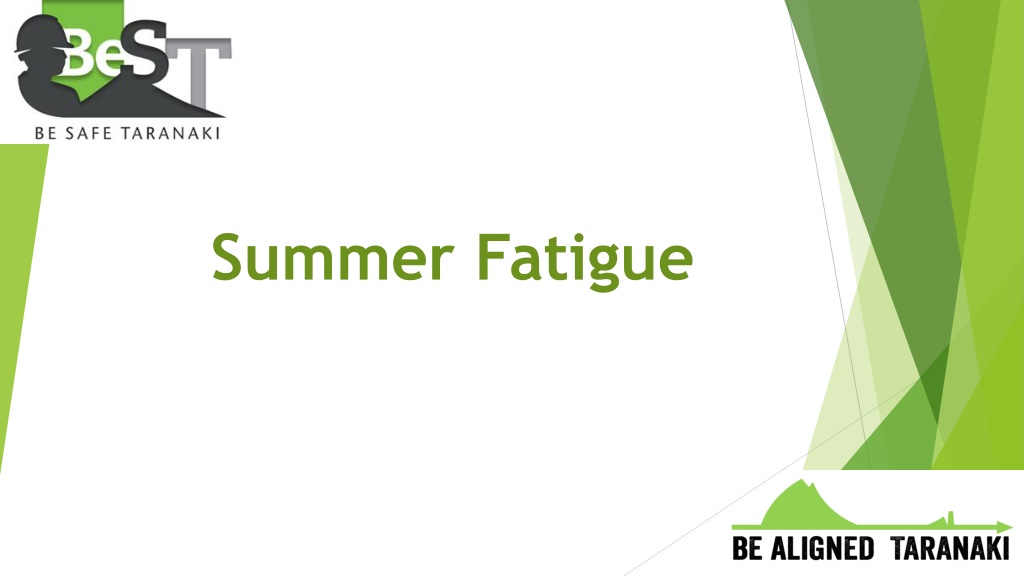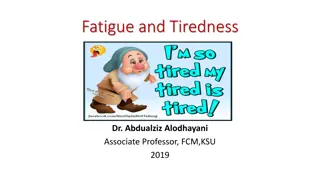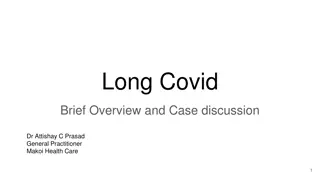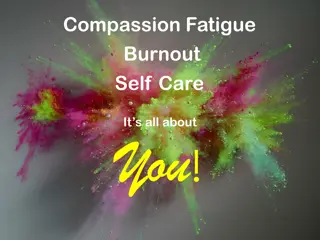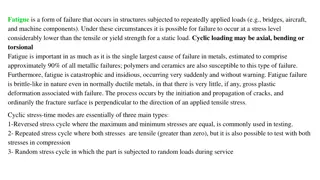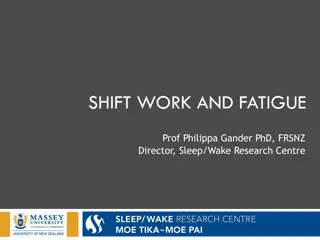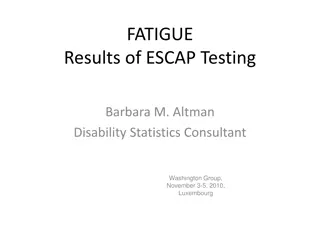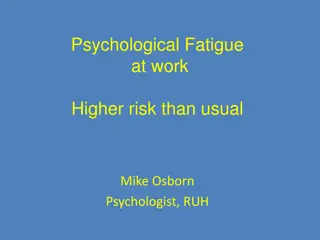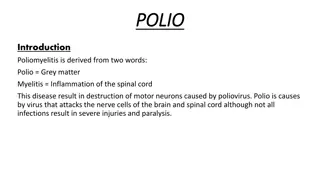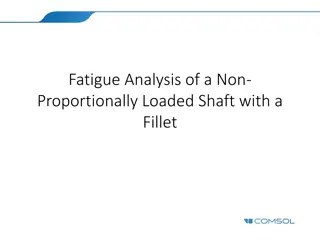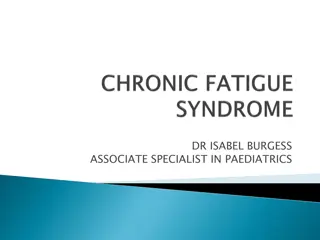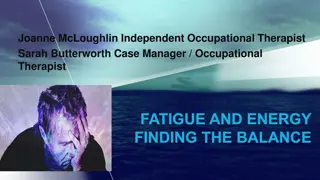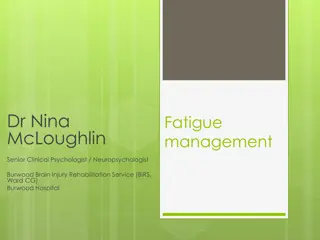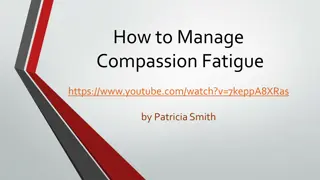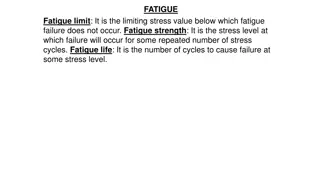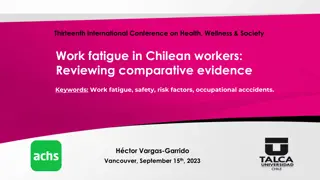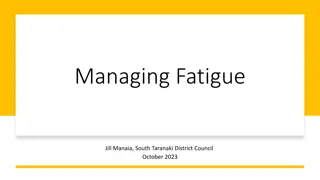Understanding Summer Fatigue and its Symptoms
Hot summer days may bring enjoyable outdoor activities but can also lead to symptoms of fatigue, insomnia, dehydration, and heat exhaustion. Environmental temperature fluctuations and lack of proper electrolytes may contribute to tiredness and exhaustion. Recognizing the signs and symptoms can help prevent and manage summer fatigue effectively.
Download Presentation

Please find below an Image/Link to download the presentation.
The content on the website is provided AS IS for your information and personal use only. It may not be sold, licensed, or shared on other websites without obtaining consent from the author. Download presentation by click this link. If you encounter any issues during the download, it is possible that the publisher has removed the file from their server.
E N D
Presentation Transcript
Hot Summer Days Hot summer days are synonymous with enjoyable outdoor pursuits, such as family days out, visits to the beach and dining al fresco. Hot weather can also cause unpleasant symptoms, such as .. Fatigue, Nausea Heat exhaustion , Dehydration, Insomnia
Fatigue Environmental temperature fluctuations, especially sudden and extreme changes such as a heat wave, can cause tiredness while the body adapts to the change
Symptoms Weakness Lack of energy Constant tiredness or exhaustion Lack of motivation Difficulty with concentration Difficulty starting and completing tasks
Insomnia Hot weather may cause you to experience restless nights, which can result in extreme fatigue during the following day. This Photo by Unknown Author is licensed under CC BY-SA
Dehydration Dehydration is a common cause of tiredness during hot weather. Dehydration occurs when body weight decreases by 1 percent or more because of fluid loss.
Electrolytes How much of each electrolyte a person needs varies depending on a multitude of things, such as genes, activity level, drug or alcohol use, caffeine consumption, sweat loss and illness. If you're losing electrolytes too quickly because of diarrhea or because of extreme physical activity, it may be a good idea to use a sports beverage to quickly replenish your electrolyte levels This Photo by Unknown Author is licensed under CC BY-SA-NC
Heat Exhaustion . Causes of heat exhaustion include exposure to high temperatures, particularly when combined with high humidity, and strenuous physical activity.
Symptoms Cool, moist skin with goose bumps when in the heat Heavy sweating Faintness Dizziness Fatigue Weak, rapid pulse Low blood pressure upon standing Muscle cramps Nausea Headache
Heat Stress at work can be influenced by the following factors: The working environment including elevated air temperatures and humidity; a high radiant heat load from equipment such as boilers; or insulating clothing constricting the worker; Personal characteristics such as age, weight, fitness, muscular activity, medical condition and acclimatization to the heat, can significantly increase the risk of contracting both Heat Stress or Heat Stroke. A Risk Assessment of conditions should be carried out where possible. If the body cannot regulate its internal temperature the onset of heat strain will occur when the body s core temperature rises above the normal level of 37 C.
Workers at Greater Risk of heat stress include: Those who are 65years of age or older, are overweight, have heart disease or high blood pressure, or take medications that may be affected by extreme heat. At work discuss with the Occupational health professional
If you think you're experiencing heat exhaustion: Stop all activity and rest Move to a cooler place Drink cool water or sports drinks Contact your occupational health professional if have access to onsite or doctor if your signs or symptoms worsen or if they don't improve within one hour.
Heat Exhaustion or Heat Stroke Call 111 As extreme summertime heat becomes more common and lasts longer, the risk of heat- related deaths and illnesses increases. There's a new twist this year, too: Wearing a face mask can make it feel even hotter. While a variety of serious health impacts, including heart attack, can result from excessive temperatures, heat exhaustion and heat stroke are among the most common. 39C
Heat Stroke begins with heat exhaustion, making it critical to first understand the signs of heat exhaustion. Four Steps to safety (Move, Loosen, Cool , and Drink) 1. Move to someplace cool 2. Loosen your clothing 3. Cool body in a cold bath or shower / spray body gently with water 4. Drink lots of water or sports drinks If in high temperatures drink 250ml of water every 15 to 20 minutes.
Managing Summer Fatigue Train supervisors and employees to recognise symptoms of heat exhaustion Work in teams or have a buddy system Share driving with a partner Apply sunscreen Cover Up Drink plenty of water Hydrate before Work, During Work, After Work Consider where drinking water is located for ease of access Avoid Energy Drinks and Alcohol Take Frequent Breaks Adjust work hours to accommodate the environmental conditions https://www.worksafe.govt.nz/topic-and- industry/temperature-at-work/working-safely-in- extreme-temperatures-gpg/
